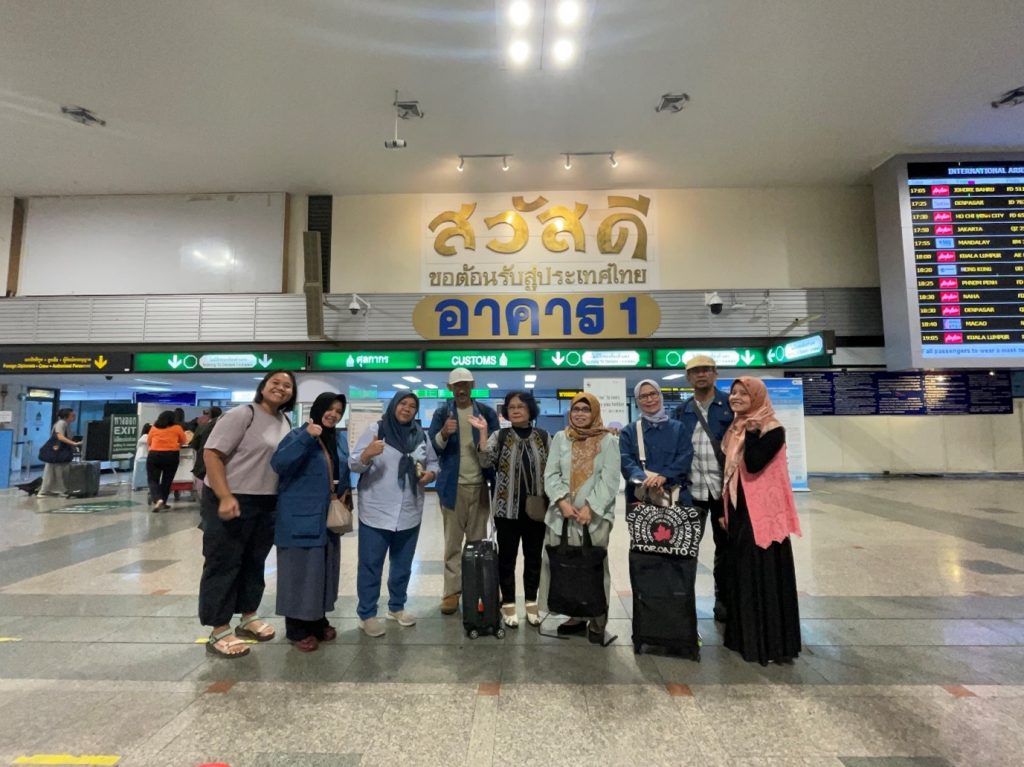Kelompok Keilmuan Sains dan Bioteknologi Tumbuhan secara aktif menjalin kerja sama dengan berbagai mitra, baik dari dalam negeri maupun luar negeri, melalui kemitraan dalam level institusi maupun fakultas/sekolah. Para mitra yang telah menjalin kerja sama dan hubungan baik di antaranya dari kalangan pemerintah, perguruan tinggi, industri, perusahaan swasta, dan asosiasi atau yayasan. Kerja sama ini dapat diimplementasikan melalui program riset kolaborasi, pengabdian masyarakat, dan program-program lainnya.
Daftar Instansi Kolaborator
- University of Groningen (Belanda)
- Osaka University (Jepang)
- Universiti Kebangsaan Malaysia (Malaysia)
- PT East West Seed Indonesia (Indonesia)
- Casa Farm Hidroponik (Indonesia)
Strengthening International Collaboration: ITB’s Plant Biotechnology Team Visits Thailand
Recognizing this, the Plant Science and Biotechnology Expertise Group (KK SBT) from the School of Life Sciences and Technology (SITH) at Bandung Institute of Technology (ITB) recently embarked on a strategic mission to Thailand on 17-19th of October 2024.







In the era of globalization and rapid scientific advancement, fostering international collaboration between nations and educational institutions has become vital for progress in science and technology. Recognizing this, the Plant Science and Biotechnology Expertise Group (KK SBT) from the School of Life Sciences and Technology (SITH) at Bandung Institute of Technology (ITB) recently embarked on a strategic mission to Thailand. The group visited Chulalongkorn University’s Department of Botany and Baiya Phytopharm, a biotech startup specializing in plant-based vaccine production under the university’s wing.
The primary objective of the visit was to explore and learn from Chulalongkorn University’s curriculum, teaching systems, and cutting-edge research in plant science and biotechnology. As one of the leading institutions in this field, Chulalongkorn provides a rich environment for scientific exchange. The interaction offered KK SBT members valuable insights into academic frameworks and ongoing research projects, enabling them to refine their own methodologies and innovation strategies.
This academic exchange is expected to broaden the perspectives of the team members, fostering new ideas and approaches in plant biotechnology. Moreover, such international collaboration enhances research networks and paves the way for higher-quality joint publications, strengthening ITB’s position in the global scientific community.
In addition to academic discussions, the visit included an industrial component, with Baiya Phytopharm providing a glimpse into the practical applications of plant biotechnology. This startup, affiliated with Chulalongkorn University, is at the forefront of using plant-based systems for health solutions, particularly in vaccine production. The visit demonstrated how academic knowledge can transition into impactful, real-world applications, from startup-level operations to larger industrial frameworks.
For KK SBT, this experience underscored the importance of bridging the gap between theoretical research and practical implementation. By understanding the operational challenges and innovations at Baiya Phytopharm, the team gained a deeper appreciation of the industry’s demands, inspiring a more application-oriented approach in their research.
This visit marks a significant step toward internationalizing KK SBT’s academic and research initiatives. The dual focus on academia and industry equips the group with a comprehensive understanding of the opportunities and challenges in plant biotechnology. As a result, ITB is better positioned to develop impactful research and foster collaborations that address global challenges.
Looking forward, the collaboration with Chulalongkorn University and its affiliates is expected to catalyze innovative solutions and bolster ITB’s contributions to the field of plant science and biotechnology. By embracing global partnerships, the team reaffirms its commitment to advancing scientific knowledge and its practical applications, ultimately driving progress for society at large.
ITB Hosts Renowned Professor to Strengthen Collaboration in Plant Science and Climate Resilience Research
From November 11 to 22, 2024, Institut Teknologi Bandung (ITB) proudly hosted Prof. Dr. Theo J. Elzenga, a Professor Emeritus at the Groningen Institute for Evolutionary Life Sciences (GELIFES) at the University of Groningen, as a Visiting Professor. This program marked a significant milestone in ITB’s efforts to foster global academic collaboration, advance agricultural research, and address critical challenges in plant science and food security in the face of climate change.
Prof. Elzenga, a global authority in plant stress physiology, captivated the ITB academic community with his research on the intricate mechanisms that plants employ to withstand environmental stressors such as drought, salinity, and flooding. His lectures and workshops delved deep into how microorganisms, including fungi and bacteria, interact with plants to enhance their resilience against these challenges. Through case studies and hands-on discussions, participants explored how such natural partnerships could be leveraged to develop climate-resilient crops—a pressing need for sustainable agriculture and global food security.
One of the highlights of the program was Prof. Elzenga’s lecture on “Plant Responses and Adaptations under Environmental Stresses”, where he emphasized the urgent need for innovative strategies to mitigate the effects of unpredictable weather patterns which resulted in plant stresses, especially drought and salinity stress. By integrating field data, molecular studies, and advanced physiological techniques, he showcased how his team in Groningen has been at the forefront of creating resilient crop systems. These insights resonated deeply with students and researchers, sparking enthusiastic discussions on how these approaches could be adapted to the Indonesian agricultural context.
This Visiting Professor initiative also highlighted the long-standing partnership between ITB and the University of Groningen. Both institutions share a vision of addressing global challenges in food security through collaborative research in plant sciences. During his visit, Prof. Elzenga participated in multiple brainstorming sessions with ITB faculty, focusing on aligning Indonesian agricultural practices with advanced methodologies from the Netherlands. Indonesia, with its unique climatic conditions and diverse agricultural landscapes, offers a living laboratory for studying plant stress tolerance. ITB researchers expressed optimism about extending these collaborations to explore local solutions with global implications, such as enhancing the resilience of staple crops and improving agricultural sustainability.











